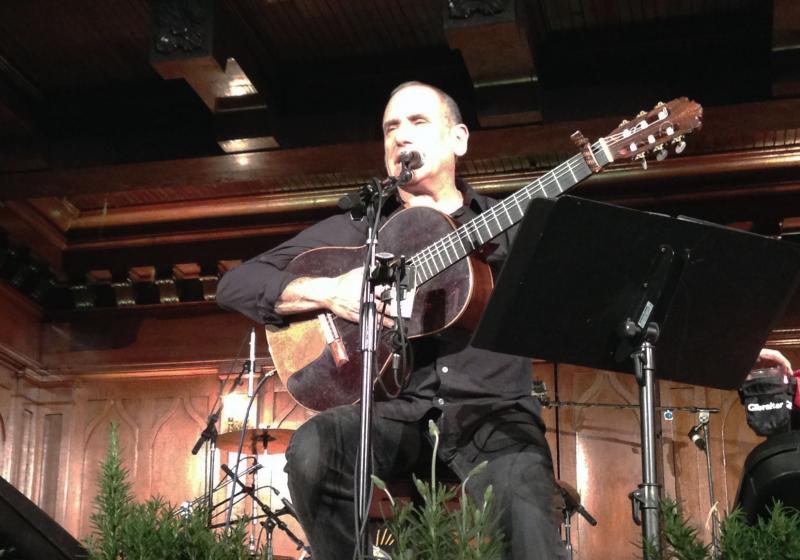Israeli Musician David Broza Brings 'East Jerusalem / West Jerusalem' To L.A.

The several hundred Angelenos watching David Broza sing at a historic former synagogue near downtown L.A. last Thursday could have easily mistaken the iconic Israeli musician for a Jewish cantor absorbed by spiritual devotion.
Broza rocked soulfully with his guitar, shimmying as if it were a flamenco dance partner. His throaty voice soared into the rafters, above stained-glass windows adorned with stars of David. But instead of reciting prayers, he spun out melodies in Hebrew, English and Spanish about love, loss, and the hope for peace in his war-torn homeland.
Many of the songs came from Broza's latest album, “East Jerusalem/West Jerusalem,” which was recorded with Israelis, Palestinians and Americans in East Jerusalem. Broza hopes that bridging cultures through music can be one small step toward peaceful coexistence.
During his Jan. 16 show at Pico-Union Project -- an interfaith cultural center housed in a 100-year-old Jewish temple -- Broza made his plea for peace through music and stories, crooning on one song, “Don’t want to preach to no one tonight, just want to tell my tale.”
That tale has spanned nearly four decades and more than 20 albums, making him beloved by generations of Israelis.
Throughout his career, Broza, 58, has occasionally woven Arabic influences into his songs. For his latest work, however, the singer-songwriter travelled even further into the Arabic soundscape – and the Arabic landscape, too.
Jerusalem is a divided city. Jews live in the west and Palestinians in the east, on the country's border with the West Bank. Israel claims Jerusalem as its capital while Palestine envisions East Jerusalem as its own. (The United States does not officially recognize either country’s sovereignty.)
For several years, Broza spent time with Palestinian musicians at Sabreen Recording Studio in East Jerusalem “having barbecues and enjoying life and getting to know each other,” he said by phone from his tour bus heading from West Virginia to Kentucky.
He was often the only Israeli.
“For Israelis to go to East Jerusalem, it’s like you would move into parts of East L.A. where everybody is speaking Spanish, or everyone is African American and you’re Caucasian,” Broza said. “You feel out of place and not comfortable -- but it’s all in your mind.”
According to Broza, that mental barrier can lead to “all kinds of phobias.”
He thought the act of making music with Israelis and Palestinians – not just anywhere but in East Jerusalem – could help ease the fear.
“It’s a precious thing to find somebody from the Palestinian side who’s open to collaboration,” Broza said. "Once I do, I give it all the support and all the love I can."
The resulting album features Palestinians playing Arabic instruments on every song, even covers of Cat Stevens, Roger Waters and Elvis Costello, musicians who have been critical of Israel.
The Palestinians lent their voices, too. One of the first artists on board was Muhammad Mughrabi from G-Town, a hip-hop group from the Shuafat refugee camp on the outskirts of East Jerusalem. He joined Israeli rapper Shaanan Streett from Hadag Nahash to sing "Peace Ain't Nothing But a Word."
Mira Awad, a Palestinian singer and actress born and raised in Israel, paid tribute to her heritage by singing in Arabic on "Key to the Memory."
Awad appeared at the Pico-Union Project show in several joyful numbers, at times dancing with Broza and his band members, who gave spirited accompaniment on electric guitar (Jonathan Levy), bass (Uri Kleinman), drums (Yuval Lion), mandolin and oud, an instrument similar to a lute (Shanir Blumenkrantz).
The musicians grew serious for “The Lion’s Den,” adapted from a poem by Judea Pearl about the murder of his son, journalist Daniel Pearl, by terrorists in Pakistan 12 years ago. The audience was spellbound until the final note, when Pearl rose from his seat in the first row and embraced Broza, tears streaming down his face.
Broza plans for the collaborations to last beyond this tour, which will take him to Washington D.C., Boston and Chicago over the next week.
Back in Israel, Broza is establishing a children’s music school in Shuafat, a crime-ridden and dangerously overcrowded refugee camp of at least 11,000 people living in 0.12 square miles. Over the past year the singer-songwriter has conducted music workshops there for kids aged 5 to 15.
A feature-length film documenting the album's recording is also in the works, slated to screen at festivals and in some theaters. The film is part of Broza’s push to appeal to an audience beyond Israel, particularly Americans. It’s for the same reason he decided to do this album entirely in English: Broza believes cultural coexistence can and should happen everywhere, not just in Jerusalem.
“I want the music to inspire people,” he said. “They can be challenging their fears wherever they live.”
Reach contributing writer Daina Beth Solomon here.



